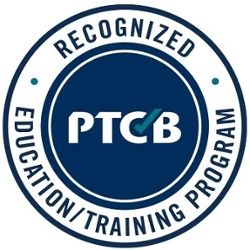If you’re considering a career as a pharmacy technician, you’ve likely come across terms like “licensed” and “certified.” While they sound similar, they actually refer to individuals who have different levels of qualifications and requirements.
Knowing the difference can help you decide what steps you need to take to become a pharmacy technician and build a successful career in healthcare. In this article, we’ll break down what it means to be licensed and certified, and how each can benefit you.
Generally speaking, a license is a state-issued permit that allows you to work as a pharmacy technician in a particular state. Nearly all states require a license, and without one, you may not be legally allowed to work in a pharmacy.
Licensing is managed by each state’s Board of Pharmacy (BOP), meaning the requirements vary depending on where you live. While specifics vary by state, some common requirements for licensure include:
-
Minimum Age: Some states require you to be at least 16 or 18 years old.
-
Educational Background: A high school diploma or equivalent is often required. However, many states
allow current high school students to obtain a license to gain hands-on experience while still in school.
-
Background Check: Many states require a background check to ensure that pharmacy technicians meet ethical and professional standards.
-
Certification: Many states require pharmacy technicians to be certified before they can be licensed.
For information on the requirements in your state, check out our
State Requirements Guide. It provides a detailed overview of the specific criteria for each state and includes direct links to your state’s Board of Pharmacy (BOP) to help you get started on your application.
Certification is a national credential that demonstrates you’ve met a higher standard of knowledge and skill in pharmacy practice. This credential shows that you have a good foundational understanding of important pharmacy practice topics such as medications, pharmacy law, and patient safety. These skills are important to providing quality patient care, and certification proves that you have them.
The PTCB is the older and more established organization. It is widely recognized by both state boards and employers across the country. Most states and employers accept this credential.
Some states and employers also accept certification from the National Healthcare Association. It offers an alternative pathway to achieving a national pharmacy technician certification.
Once you pass the certification exam, you will earn the title of Certified Pharmacy Technician and can use the designation CPhT after your name. This designation not only improves your professional credibility but also signals your commitment to upholding high standards in pharmacy practice.
Since its founding in 1995, the Pharmacy Technician Certification Board (PTCB) has certified over 800,000 pharmacy technicians, making it the most trusted certifying body in the field. To earn this certification, you’ll need to pass the Pharmacy Technician Certification Exam (PTCE), which evaluates your knowledge of several areas of pharmacy practice.
To be eligible for the PTCE, the PTCB requires you to meet specific criteria:
One of the main eligibility requirements is to either complete a program recognized by the PTCB or have at least 500 hours of equivalent work experience as a pharmacy technician. Completing the
1st Pass CPhT Course from Pharmacy Technician Academy fulfills this requirement and provides you with the knowledge needed to pass the exam on your first attempt.
Along with completing an approved course or having equivalent work experience, the PTCB also requires you to meet the following criteria.
- You must reside in the United States or its territories.
- You must fully disclose of any criminal history and any actions by a State Board of Pharmacy related to registration or licensure is also required.
The PTCB does not have minimum age or high school diploma requirement for certification. This makes getting certified an excellent opportunity for high school students interested in gaining experience in the health professions.
The PTCB offers flexibility in testing locations. The certification exam can be taken either in person at an approved testing center or online. This allows you to choose the setting that best fits your needs.
If you’re aspiring to start a career as a pharmacy technician, obtaining a license is necessary in nearly all states. A pharmacy technician license gives you the legal ability to work in a pharmacy and shows that you’ve met the minimum standards required by your state.
In many states, certification is also a prerequisite for licensing, meaning that to become licensed, you’ll need to pursue certification as well. This dual requirement ensures that pharmacy technicians are fully prepared and meet high standards of pharmacy practice.
Even if certification isn’t mandatory in your state, it’s highly recommended and comes with several advantages:
-
A certified pharmacy technician requires less on-the-job training and is often seen as better equipped to provide high-quality patient care.
-
Certification can open doors to higher-level positions and is often associated with better pay, making it a valuable asset for long-term career growth.
-
In some states, certified pharmacy technicians are allowed to perform additional tasks, such as administering immunizations or working independently under certain conditions.
-
Certification shows that you’re dedicated to the field of pharmacy and willing to meet national standards.


